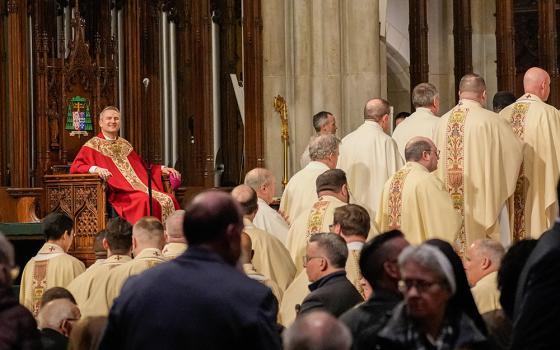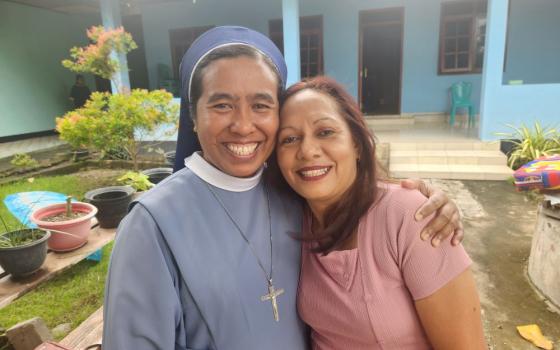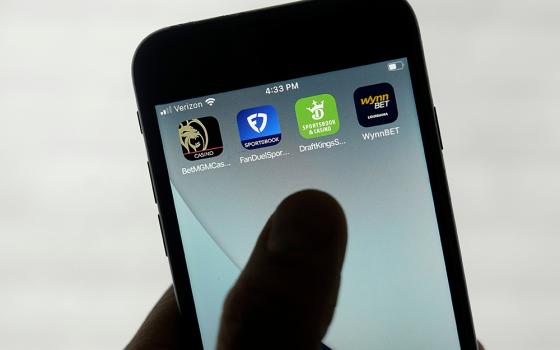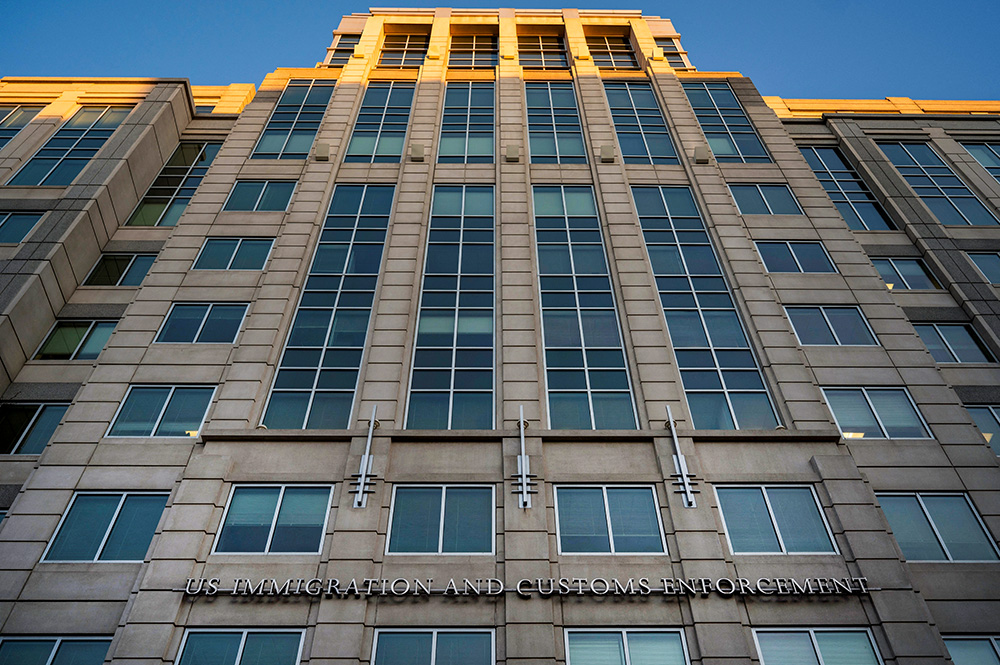
Sunlight hits the U.S. Immigration and Customs Enforcement building in Washington Jan. 18, 2025. (OSV News/Reuters/Vincent Alban)
Congregations of women religious that invite sisters from overseas to do religious work in the United States will now find the process much more difficult, due to recent policy changes by the Trump administration.
Experts from the Catholic Legal Immigration Network, known as CLINIC, told attendees at the Resource Center for Religious Institutes' annual conference that the Trump administration has made 462 policy changes on immigration — so far. The conference, with several hundred attendees, ran Sept. 30-Oct. 3 in Dallas.
Many of those immigration policy changes, such as mass deportations, are getting a lot of attention, but others, such as the R-1 Visa program, which allows foreign religious workers into the United States, are also seeing changes, CLINIC officials told conference attendees.
Even if sisters are not directly affected by a policy change, they should expect everything in the process to be more difficult and take longer, because immigration officials "are not trying to provide any customer service," said Graciela Mateo, managing attorney of CLINIC's Religious Immigration Services section.
The application to begin the process of qualifying for an R-1 visa may take longer than before, and once the application is approved, Mateo said, it could be a longer wait for a visa interview. Sometimes the interview requirement is waived, Mateo said, but consulate officers can change their mind and require an interview if they see anything in the paperwork that raises questions.
"Consulate officers have a tremendous amount of discretion," she said. "Many times, you'll have two applicants from the same congregation, and one will be approved and one won't be."
Advertisement
Applicants should also expect their social media to be closely scrutinized, said Miguel Naranjo, director of CLINIC's Religious Immigration Services section.
Naranjo said it's not a change that officials can search applicants' social media posts, but it is a change that they are now reviewing social media platforms often and extensively. Investigating social media accounts of applicants for student visas has been in the news for months, but Naranjo said those seeking religious worker visas should expect it, as well.
"Any comments that are critical of the government, that are critical of the administration or that favor one country over another can be reason to deny an application," he said.
Naranjo said the amount of time an R-1 visa is valid has changed: The move wasn't announced, but clients of CLINIC have begun seeing much shorter periods the visas are good for. Until recently, in most cases, religious worker visas have been valid for 2 1/2 years, but there are exceptions, such as Mexico, where they are only valid for 12 months.
But now, Naranjo said, R-1 visas issued to religious workers from some countries in Africa are only valid for 90 days; applicants in other African countries are not getting visas at all.
The religious worker visas also used to allow multiple entries, meaning a religious worker could minister in the United States, then go home to visit family or their religious congregation, and use that visa to reenter the U.S. Now, Naranjo said, they are seeing R-1 visas with only one entry allowed, meaning if a visa holder leaves the country, they will not be allowed back in without a new visa.
"It's a great inconvenience," he said. "It's obviously going to cause some great disruptions."
Another change as of Sept. 6, Mateo said, is that all applicants must schedule their visa interview in their country of nationality or residence. Previously, applicants could schedule their interviews in a third country, such as Italy, where consular officers in Rome are used to handling religious worker visas and are seen as much friendlier to those applicants.
It also means an R-1 visa holder in the United States who is applying to renew their visa must return home for their interview, even if it's on the other side of the world. Before, those applicants could have their interview much closer, such as in Canada, saving time and expense.
Naranjo said religious worker visa holders should be cautious about asking to change their status, such as asking for permanent residency. The R-1 visa is meant to be temporary and applicants must show they intend to stay in the United States only temporarily; asking later to stay permanently, he said, could be seen as misrepresentation on the original visa application and cause for removal.
"Under the current environment we're in, CBP [Customs and Border Protection] is looking at that much more closely," he said.
Mateo said members of religious congregations have the option of using a visitor visa, but there are many restrictions — you cannot be paid or compensated for work, for example, or engage in fundraising — and violating those rules could get you barred from ever coming back to the United States.
Mateo said there is another problem with using a visitor visa: Applicants from countries with a high rate of people overstaying their visa now have to post a bond of up to $15,000, which would be forfeit if they remained in the United States after the visa expired.
Applicants in Mali, Mauritania, São Tomé and Príncipe, Tanzania, Gambia, Malawi and Zambia must post a bond, with the amount set by the consulate officer at the visa interview.
Congregations that sponsor colleges or universities could also be affected by the changes proposed for student visas, Naranjo said. The administration wants to have student visas expire on a fixed date, such as in four years for someone studying for a bachelor's degree. Other changes include cutting the 60-day grace period after graduation to 30 days, requiring students to complete a full year of their program before transferring to another school, and requiring that any second degree must be a higher level than a student's first degree, meaning a visa holder in a master's program could not use that visa to study for a second master's degree.
"The government wants them to leave," Naranjo said. "They don't want them to stay here."
Currently, the government has a total ban on all types of visas for applicants in Afghanistan, Chad, Republic of Congo, Equatorial Guinea, Eritrea, Haiti, Iran, Libya, Myanmar, Somalia, Sudan and Yemen. Visas for seven other countries — Burundi, Cuba, Laos, Sierra Leone, Togo, Turkmenistan, and Venezuela — are severely restricted and only eligible for certain nonimmigrant visas.
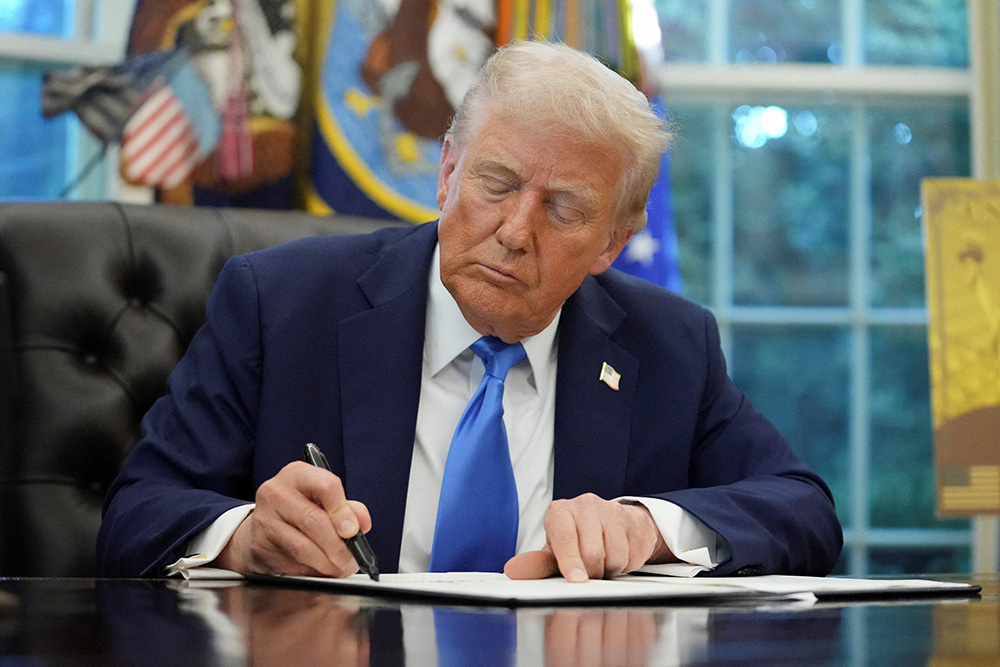
U.S. President Donald Trump signs an executive order in the Oval Office at the White House in Washington Sept. 19, 2025. Trump signed two executive orders, one to establish a visa program overseen by the secretary of commerce called the "Trump Gold Card" and one to introduce a $100,000 fee for H-1B visas. (OSV News/Retuers/Ken Cedeno)
Naranjo said very few religious congregations make use of the H-1B visa, which is for highly educated people working in specialized fields, and he expects that number to drop to zero: New applicants for that visa must pay a $100,000 fee with their application.
"I don't think a lot of religious congregations or dioceses are willing to pay $100,000 just to keep their worker here," he said.
Naranjo said those visas are also not often used by congregations because they require the worker to be paid prevailing wages and are subject to a lottery system.
But congregations that sponsor hospitals or health systems could feel an impact: Politico reported that hospitals in rural areas — where many times Catholic health care providers are the only option — will be hit especially hard by the $100,000 fee.
Nearly a quarter of the physicians in the United States are international, Politico said, and they are overrepresented in areas with doctor shortages. Iowa, North Dakota and West Virginia have the highest percentage of doctors who may need an H-1B visa, and those health systems are the least likely to be able to afford a $100,000 fee for each doctor.
Those with religious worker visas that are applying for permanent residency — a program that is already backed up by more than four years — will see another delay: Other immigration programs are funded by user fees, but funding for the religious worker permanent residency program ended when the federal government shut down Oct. 1, and will not operate until funding is restored by congressional action, Naranjo said.
And everything in every program, he said, is subject to change.
"Things can change really quickly," Naranjo said. "What has already happened in the last 10 months is unprecedented, I would even say historic."




